|
Books Should Be Free Loyal Books Free Public Domain Audiobooks & eBook Downloads |
|
|
Books Should Be Free Loyal Books Free Public Domain Audiobooks & eBook Downloads |
|
History Books |
|---|
|
Book type:
Sort by:
View by:
|
By: Muriel O. Davis | |
|---|---|
 Political History of France, 1789-1910
Political History of France, 1789-1910
This little book opens on the eve of the French Revolution. The government is crippled by financial mismanagement, ruled by a King who, in the author's words, is "devoid of both ability and energy," and resented by a tax-oppressed peasantry and a rising middle class. The Revolution escapes the control of its instigators and France is plunged into the Terror and international war. Enter Napoleon, a man with "an enormous capacity for work," who can "get to the root of a matter and master technicalities with great swiftness," but whose "vulgar desire for recognition... | |
By: Mykhailo Hrushevsky (1866-1934) | |
|---|---|
 Historical Evolution of the Ukrainian Problem
Historical Evolution of the Ukrainian Problem
A short history of Ukrainian national aspirations, written by one of the most prominent Ukrainian historians. Published in the early months of World War I. - Summary by Kazbek | |
By: N. E. Dionne (1848-1917) | |
|---|---|
 The Makers of Canada: Champlain
The Makers of Canada: Champlain
A biography of Samuel de Champlain, French explorer, founder of Quebec, and father of New France. ( | |
By: Nat Love (1854-1921) | |
|---|---|
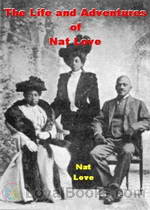 The Life and Adventures of Nat Love, Also Known As Deadwood Dick
The Life and Adventures of Nat Love, Also Known As Deadwood Dick
Nat Love was born a slave, emancipated into abject poverty, grew up riding the range as a cowboy and spent his maturity riding the rails as a Pullman Porter. For me, the most amazing thing about him is that despite the circumstances of his life, which included being owned like a farm animal solely because of the color of his skin and spending later decades living and working as an equal with white coworkers, he was an unrepentant racist! Convinced that the only good Indian was a dead one, and that... | |
By: Nathaniel Hawthorne (1804-1864) | |
|---|---|
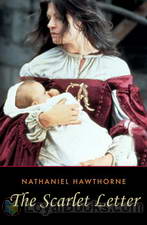 The Scarlet Letter
The Scarlet Letter
A beautiful woman who is punished for the mortal sin of loving a man other than her husband, a cowardly lover, a vengeful husband, a rebellious illegitimate child and the oppressive and patriarchal morality of 17th century Puritanism in Boston. Together these form an unforgettable and thought-provoking glimpse of how much social attitudes have changed over the centuries. Nathaniel Hawthorne was the creator of such beloved works as Twice-Told Tales, A Wonder Book for Boys and Girls, The House of the Seven Gables and spine-chilling tales like Roger Malvin's Burial... | |
By: National Advisory Commission on Civil Disorders | |
|---|---|
 Report of the National Advisory Commission on Civil Disorders (Kerner Commission Report)
Report of the National Advisory Commission on Civil Disorders (Kerner Commission Report)
The summer of 1967 again brought racial disorders to American cities, and with them shock, fear and bewilderment to the nation. The worst came during a two-week period in July, first in Newark and then in Detroit. Each set off a chain reaction in neighboring communities. On July 28, 1967, the President of the United States [Lyndon B. Johnson] established this Commission and directed us to answer three basic questions: What happened? Why did it happen? What can be done to prevent it from happening again? This is our basic conclusion: Our nation is moving toward two societies, one black, one white--separate and unequal... | |
By: Neil Munro (1863-1930) | |
|---|---|
 Doom Castle
Doom Castle
Doom Castle is the story of young Count Victor's journey to Scotland after the Jacobite Rebellion, searching for a traitor to the Jacobite cause as well as a mysterious man under the name of "Drimdarroch", whom he swore revenge. After a perilious journey, Count Victor arrives at Doom Castle as a guest of the enigmatic Baron of Doom, his two strange servitors and his beautiful daughter... (Summary by Carolin) | |
By: Nellie McClung (1873-1951) | |
|---|---|
 In Times Like These
In Times Like These
" Believing that the woman's claim to a common humanity is not an unreasonable one, and that the successful issue of such claim rests primarily upon the sense of fair play which people have or have not according to how they were born, and Therefore to men and women everywhere who love a fair deal, and are willing to give it to everyone, even women, this book is respectfully dedicated by the author." | |
By: Nennius | |
|---|---|
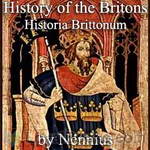 History of the Britons (Historia Brittonum)
History of the Britons (Historia Brittonum)
Although the origin of this book is much debated it remains, perhaps, one of the earliest recorded histories of Britain. It was believed that Nennius wrote the book around 796AD. If indeed he wrote this record, Nennius is recognised as being a teller, and embellisher, of historic characters and events.This book remains notable however, as one of the earliest that mention Arthur (The King of Arthurian legend). | |
By: Niccolò Machiavelli (1469-1527) | |
|---|---|
 History of Florence and of the Affairs of Italy
History of Florence and of the Affairs of Italy
History of Florence and of the Affairs of Italy is an historical account by Niccolò Machiavelli. Toward the end of 1520, the Cardinal Giulio of Medici, later Pope Clement VII, offered Machiavelli the appointment to write a history of Florence. Although Machiavelli was reluctant to accept, accepting was his only way to regain the good graces of the Medici who had regained power and were in a position to offer him employment and protection. Doing the history also provided a way for Machiavelli’s views to become the “official” history of Florentine and Italian affairs. Once completed, the work was presented officially to Giulio, now Pope, in May of 1526. | |
By: Nicholas Canzona (1925-1985) | |
|---|---|
 U. S. Marine Operations in Korea 1950-1953, Volume 1: The Pusan Perimeter
U. S. Marine Operations in Korea 1950-1953, Volume 1: The Pusan Perimeter
It meant little to most Americans on 25 June 1950 to read in their Sunday newspapers that civil strife had broken out in Korea. They could hardly have suspected that this remote Asiatic peninsula was to become the scene of the fourth most costly military effort of American history, both in blood and money, before the end of the year. With a reputation built largely on amphibious warfare, Marines of the 1st Brigade were called upon to prove their versatility in sustained ground action. On three separate occasions within the embattled Perimeter—south toward Sachon and twice along the Naktong River—these Marine units hurled the weight of their assault force at the enemy... | |
By: Noah Davis (b. 1804) | |
|---|---|
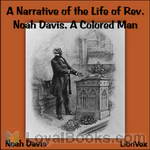 A Narrative of the Life of Rev. Noah Davis, A Colored Man
A Narrative of the Life of Rev. Noah Davis, A Colored Man
The object of the writer, in preparing this account of himself, is to RAISE SUFFICIENT MEANS TO FREE HIS LAST TWO CHILDREN FROM SLAVERY. Having already, within twelve years past, purchased himself, his wife, and five of his children, at a cost, altogether, of over four thousand dollars, he now earnestly desires a humane and Christian public to AID HIM IN THE SALE OF THIS BOOK, for the purpose of finishing the task in which he has so long and anxiously labored. God has blessed him in an extraordinary... | |
By: Notker the Stammerer | |
|---|---|
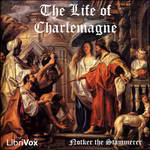 The Life of Charlemagne (Notker)
The Life of Charlemagne (Notker)
Notker’s work consists of anecdotes relating chiefly to the Emperor Charlemagne and his family. It was written for Charles the Fat, great-grandson of Charlemagne, who visited Saint Gall in 883. It has been scorned by traditional historians, who refer to the Monk as one who “took pleasure in amusing anecdotes and witty tales, but who was ill-informed about the true march of historical events”. However, several of the Monk’s tales, such as that of the nine rings of the Avar stronghold, have been used in modern biographies of Charlemagne. | |
By: Okakura Kakuzo (1863-1913) | |
|---|---|
 The Book of Tea
The Book of Tea
The Book of Tea was written by Okakura Kakuzo in the early 20th century. It was first published in 1906, and has since been republished many times. – In the book, Kakuzo introduces the term Teaism and how Tea has affected nearly every aspect of Japanese culture, thought, and life. The book is noted to be accessibile to Western audiences because though Kakuzo was born and raised Japanese, he was trained from a young age to speak English; and would speak it all his life, becoming proficient at communicating his thoughts in the Western Mind... | |
By: Olive Gilbert (?-?) & Sojourner Truth (1797-1883) | |
|---|---|
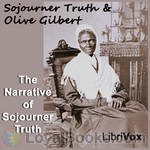 The Narrative of Sojourner Truth
The Narrative of Sojourner Truth
The Narrative of Sojourner Truth is the gripping autobiographical account of Sojourner Truth's life as a slave in pre-Civil War New York State, and her eventual escape to Freedom. Since Sojourner could neither read or write, she dictated her story to Olive Gilbert after they met at a Women’s Rights rally. The Narrative was first published in 1850, and was widely distributed by the Abolitionist Movement. It was one of the catalysts for the rise of anti-slavery public opinion in the years leading up to the Civil War... | |
By: Olive Schreiner (1855-1920) | |
|---|---|
 Thoughts on South Africa
Thoughts on South Africa
'Thoughts on South Africa' is a collection of Schreiner's observations of colonial South Africa in the early 19th century, mostly regarding Boer-English relations. The book was published posthumously in 1923. Prospective listeners should be aware that it reflects the place, culture and language of the time in which it was written. | |
By: Oliver Lodge (1851-1940) | |
|---|---|
 Pioneers of Science
Pioneers of Science
This book takes its origin in a course of lectures on the history and progress of Astronomy arranged for Sir Oliver Lodge in the year 1887. The first part of this book is devoted to the biographies and discoveries of well known astronomers like Copernicus, Brahe, Kepler, Galileo and Newton. In the second part, the biographies take a back seat, while scientific discoveries are discussed more extensively, like the discovery of Asteroids and Neptune, a treatise on the tides and others. | |
By: Oliver Optic | |
|---|---|
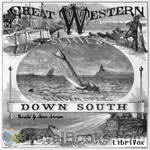 Down South or Yacht Adventure in Florida
Down South or Yacht Adventure in Florida
"Down South" is the fifth and last volume but one of the "Great Western Series." The action of the story is confined entirely to Florida; and this fact may seem to belie the title of the Series. But the young yachtsman still maintains his hold upon the scenes of his earlier life in Michigan, and his letters come regularly from that State. If he were old enough to vote, he could do so only in Michigan; and therefore he has not lost his right to claim a residence there during his temporary sojourn in the South... | |
 Haste and Waste; The Young Pilot of Lake Champlain
Haste and Waste; The Young Pilot of Lake Champlain
The sixth and last volume of the Woodville stories contains the record of a mechanical, rather than a moral triumph, though the virtues of patience and perseverance are incidentally illustrated, and the "little captain" of the Woodville is always a good son, a forbearing brother, and a kind friend. Lawry Wilford, the young pilot, is a boy of spirit and energy, who overcomes difficulties by a strong faith in himself, and redeems his family from poverty, in spite of the bad example and the bad conduct of his father and his older brother... | |
By: Oliver Wendell Holmes, Sr. (1809-1894) | |
|---|---|
 My Hunt After 'The Captain'
My Hunt After 'The Captain'
Holmes describes his frantic search through Civil War torn landscapes for his wounded son, the future Supreme Court Justice. Originally published in The Atlantic Magazine, 1862. Holmes, Sr. (1809 -1894) was an American physician, poet, professor, lecturer, and author. He was regarded by his peers as one of the best writers of the 19th century. His most famous prose works are the "Breakfast Table" series, which began with The Autocrat of the Breakfast Table (1858). He is also recognized as an important medical reformer. | |
By: Osborne Perry Anderson (1830-1872) | |
|---|---|
 Voice From Harper's Ferry
Voice From Harper's Ferry
A Voice from Harper's Ferry is the abolitionist testament of Osborne Perry Anderson, the only surviving black participant in the 1859 raid on Harpers Ferry organized by John Brown. The book details the motivations and preparations for the raid, the events that unfolded over several days in October 1859, and Anderson's subsequent escape. It ends with a short selection of poems from various sources honoring Brown and the movement for abolition. | |
By: Oscar Browning (1837-1923) | |
|---|---|
 Guelphs and Ghibellines: A Short History of Mediaeval Italy from 1250-1409
Guelphs and Ghibellines: A Short History of Mediaeval Italy from 1250-1409
The High Middle Ages in Italy, 1250-1409, were a time of incessant strife between rival city-states, some the Ghibelline allies of the Holy Roman Empire, others joining forces with the Guelph armies of the Papacy. Mercenary captains led hired bands of soldiers of fortune. These captains sometimes became great despots, ruling the very cities that had engaged them. Florence began her ascent. The terrible Visconti dominated Milan, and Genoa established a vast trading empire, only to suffer defeat and decline when her fleet was destroyed by Venice, the Queen of the Adriatic. | |
 Age of the Condottieri: A Short History of Mediaeval Italy from 1409-1530
Age of the Condottieri: A Short History of Mediaeval Italy from 1409-1530
Italy from 1409 to 1530 is synonymous with the Renaissance, but this was also the age of the condottieri, Italian captains of mercenary companies and multinational armies who fought in the service of city states, monarchs, and the Pope. Some like Ludovico Sforza in Milan seized power and founded dynasties in their own right. The merchant princes of the Medici family reached their apogee in Lorenzo the Magnificent in Florence, but faltered in the Papacy; Leo X proved no match for Martin Luther and Clement VII was powerless to avert the sack of Rome in 1527... | |
 Modern England 1820-1885
Modern England 1820-1885
This short survey opens with the accession of that portly spendthrift, King George IV. With British support, Greece becomes independent. The Irish, under O'Connell, carry agitation to the point of rebellion, forcing Parliament to pass the Catholic Emancipation Act. After a painful labor of over a year, the First Reform Bill is enacted in 1832. Queen Victoria comes to the throne in 1837. Faced with an Irish famine, Sir Robert Peel, repeals the Corn Laws. There is a Great Exhibition, a war in the Crimea, and a rebellion in India. Gladstone and Disraeli battle on the floor of the House of Commons, while British imperialism advances in South Africa and in Egypt. - Summary by Pamela Nagami | |
By: Oscar D. Skelton (1878-1941) | |
|---|---|
 Chronicles of Canada Volume 32 - The Railway Builders: A Chronicle of Overland Highways
Chronicles of Canada Volume 32 - The Railway Builders: A Chronicle of Overland Highways
When the pace of railroad construction slackened in 1914, Canada had achieved a remarkable position in the railway world. Only five other countries—the United States, Russia, Germany, India, and, by a small margin, France—possessed a greater mileage; and, relatively to population, none came anywhere near her. This is the story of how Canada became a country stitched together by rail. | |
By: Oscar Micheaux (1884-1951) | |
|---|---|
 Forged Note: A Romance of the Darker Races
Forged Note: A Romance of the Darker Races
This novel investigates the black urban community of the early twentieth century, highlighting the base degradation and violence there. But the story also focuses on the white man's obsession with black women. The issue of miscegenation is at the center of the plot, involving the two central characters, both black, but light skinned. They are Sydney Wyeth and Mildred Latham. Sydney is the author of a book that he tries to sell to members of the black community, especially, because he is interested in advancing the race through education... | |
By: Osgood E. Fuller (1835-1900) | |
|---|---|
 Brave Men and Women: Their Struggles, Failures, And Triumphs
Brave Men and Women: Their Struggles, Failures, And Triumphs
Brave Men and Women is a collection of stories about historical figures who, through success and failure, made an impact on their world. As noted in the Preface, the author's aim "has simply been to form a sort of mosaic or variegated picture of the Brave Life - the life which recognizes the Divine Goodness in all things, striving through good report and evil report, and in manifold ways, which one is often unqualified to judge, to attain to the life of Him who is 'the light of the world'." - Summary by Kristin Hand | |
By: Osmund Airy (1845-1928) | |
|---|---|
 English Restoration and Louis XIV: From the Peace of Westphalia to the Peace of Nimwegen
English Restoration and Louis XIV: From the Peace of Westphalia to the Peace of Nimwegen
In this trim volume the British historian, Osmund Airy writes of the period between 1648 and 1679 when Cardinal Mazarin, having concluded the masterly Peace of Westphalia for France, confronts the rebellions of the nobility known as the Fronde. By the time of his death in 1661, Mazarin has completed the work of Richelieu and made Louis XIV an absolute monarch, ready to extend his borders by conquest. But in Holland, the young Stadtholder, William III of Orange, resolutely opposes Louis's military... | |
By: Owen Wister | |
|---|---|
 Ulysses S. Grant
Ulysses S. Grant
Ulysses S. Grant was the great hero (for the North) in the Civil War and the 18th President of the United States. This short biography is only 145 pages in a little pamphlet size. The author is famous for his stories of the Old West, but he also wrote a substantial body of nonfiction literature. | |
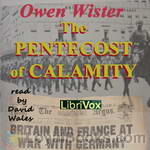 The Pentecost of Calamity
The Pentecost of Calamity
Nonfiction. Appalled by the savagery of World War I, Owen Wister in 1915 published an attempt to move the United States out of neutrality into joining the Allies against Germany. His aim was the quicker defeat of that nation. (Wister: “the new Trinity of German worship – the Super-man, the Super-race, and the Super-state.”) He was but one of many literary personages who joined in this effort. A moving quote: “Perhaps nothing save calamity will teach us what Europe is thankful to have learned again – that some things are worse than war, and that you can pay too high a price for peace; but that you cannot pay too high for the finding and keeping of your own soul.” | |
 Lady Baltimore
Lady Baltimore
Augustus visits King's Port, South Carolina, at the request of his Aunt Carola, and at her expense. She wants him to research geneaologies and records to find proof that he is descended from royalty so that he can join her exclusive club, the Colonial Society. While there, he becomes involved in a love affair between John Mayrant and Eliza La Heu. | |
By: Patrick Henry (1736-1799) | |
|---|---|
 Give Me Liberty or Give Me Death
Give Me Liberty or Give Me Death
This speech was given March 23, 1775, at St. John’s Church in Richmond, Virginia, and is credited with having singlehandedly convinced the Virginia House of Burgesses to pass a resolution delivering the Virginia troops to the Revolutionary War. In attendance were Thomas Jefferson and George Washington. Reportedly, the crowd, upon hearing the speech, jumped up and shouted, “To Arms! To Arms!” | |
By: Paul Laurence Dunbar (1872-1906) | |
|---|---|
 In Old Plantation Days
In Old Plantation Days
With this collection of short stories, Dunbar sought to draw on the success of his dialect poems by recreating and portraying the southern plantation during slavery. The stories focus on the stereotypical portrait of slaves as obedient workers happy to spend their lives in service of their benevolent owner. His attempt to find success was only partially realized, as his stories drew not only criticism but, in some cases, anger at their very stereotypical nature. The book itself, however, proved to be more lucrative than previous fiction works had been for the author. | |
By: Peter Fisher (1782-1848) | |
|---|---|
 History of New Brunswick
History of New Brunswick
Originally published in 1825 under the title: Sketches of New Brunswick : containing an account of the first settlement of the province, with a brief description of the country, climate, productions, inhabitants, government, rivers, towns, settlements, public institutions, trade, revenue, population, &c., by an inhabitant of the province. The value of this history is in the fact that it was written when the Province was still in its infancy. Although there had been a few small settlements established in New Brunswick prior to 1783, the main influx of settlers were Loyalists who chose to remove to the area from the United States following the American Revolution. | |
By: Peter H. Ditchfield | |
|---|---|
 Vanishing England
Vanishing England
VANISHING ENGLANDby P. H. DITCHFIELDINTRODUCTIONThis book is intended not to raise fears but to record facts. We wish to describe with pen and pencil those features of England which are gradually disappearing, and to preserve the memory of them. It may be said that we have begun our quest too late; that so much has already vanished that it is hardly worth while to record what is left. Although much has gone, there is still, however, much remaining that is good, that reveals the artistic skill and taste of our forefathers, and recalls the wonders of old-time... | |
By: Peter Kropotkin (1842-1921) | |
|---|---|
 Memoirs of a Revolutionist, Vol. 1
Memoirs of a Revolutionist, Vol. 1
'Peter Kropotkin was a Russian anarcho-communist and scientist. This is his autobiography, and he writes not only about his own life, but also about 19th century Russian society and politics. He was born into the nobility and had a military education, but he gradually abandoned the values of his social class and became an anti-authoritarian socialist, opposed to both the rule of the Tsars and to the seizing of power by the authoritarian Bolsheviks. He was also interested in literature, biology, economics and geographical exploration. This first volume of his memoirs covers his childhood, his education, and the time he spent in Siberia. '. (Introduction by Elin, ) | |
 Memoirs of a Revolutionist, Vol. 2
Memoirs of a Revolutionist, Vol. 2
Peter Kropotkin was a Russian anarcho-communist and scientist. This is his autobiography, and he writes not only about his own life, but also about 19th century Russian society and politics. He was born into the nobility and had a military education, but he gradually abandoned the values of his social class and became an anti-authoritarian socialist, opposed to both the rule of the Tsars and to the seizing of power by the authoritarian Bolsheviks. He was also interested in literature, biology, economics and geographical exploration. This second and last volume of his memoirs covers his time in St Petersburg, his time in prison, and his journeys in Western Europe. ( | |
By: Philip Gibbs (1877-1962) | |
|---|---|
 Now It Can Be Told
Now It Can Be Told
In this book I have written about some aspects of the war which, I believe, the world must know and remember, not only as a memorial of men's courage in tragic years, but as a warning of what will happen again--surely--if a heritage of evil and of folly is not cut out of the hearts of peoples. Here it is the reality of modern warfare not only as it appears to British soldiers, of whom I can tell, but to soldiers on all the fronts where conditions were the same... The purpose of this book is to get... | |
By: Phoebe Yates Pember (1823-1913) | |
|---|---|
 Reminiscences of a Southern Hospital, by Its Matron
Reminiscences of a Southern Hospital, by Its Matron
Phoebe Yates Pember served as a matron in the Confederate Chimborazo military hospital in Richmond, Virginia, during the Civil War, overseeing a dietary kitchen serving meals to 300 or more wounded soldiers daily. Reminiscences of a Southern Hospital is her vivid recounting of hospital life and of her tribulations (and personal growth) as a female administrator. To follow her from day one, when she is greeted with “ill-repressed disgust” that “one of them had come,” and she, herself, “could... | |
By: Pierre Beaumarchais (1732-1799) | |
|---|---|
 Barber of Seville
Barber of Seville
Count Almaviva's heart is stolen when he lays eyes on Rosine, but he worries that she will only love him for his money. Can Figaro help him? This comedy is the first play in Beaumarchais' Figaro trilogy. It was written in 1773, but because of political and legal problems, Beaumarchais could not stage the play until 1775. The Barber of Seville was adapted into at least five operas, the best-known being by Rossini. The other plays in the trilogy are The Follies of a Day: or the Marriage of Figaro and The Guilty Mother... | |
By: Pierre Gustave Toutant Beauregard (1818-1893) | |
|---|---|
 The First Battle of Bull Run
The First Battle of Bull Run
General Pierre Gustave Toutant Beauregard was one of the senior commanders of Southern forces during the Civil War. It was he who initiated the hostilities by opening fire on Ft. Sumter in Charleston harbor, in April, 1861. In July of that year, having taken command of the Confederate Army of the Potomac, he triumphed in the first serious clash of the war, at Manassas, Virginia. His army, aided by reinforcements from Johnston’s army in the Shenandoah Valley, routed a Federal army under General McDowell... | |
By: Pierre Loti (1850-1923) | |
|---|---|
 War
War
Pierre Loti [Julien Viaud] (1850-1923) was a French naval officer and novelist. The present book is one of his few works of non-fiction, a small collection of letters and diary entries that describe his views and experiences in the wars and military operations in which he participated. Besides World War I, he also sheds light upon his views and involvement in the preparations for the Turkish Revolution of 1923, for which until today a famous hill and popular café in Istanbul are named after him. | |
By: Plato (428/427 BC - 348/347 BC) | |
|---|---|
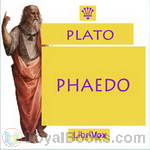 Phaedo
Phaedo
Plato's Phaedo is one of the great dialogues of his middle period, along with the Republic and the Symposium. The Phaedo, which depicts the death of Socrates, is also Plato's seventh and last dialogue to detail the philosopher's final days (the first six being Theaetetus, Euthyphro, Sophist, Statesman, Apology, and Crito).In the dialogue, Socrates discusses the nature of the afterlife on his last day before being executed by drinking hemlock. Socrates has been imprisoned and sentenced to death by an Athenian jury for not believing in the gods of the state and for corrupting the youth of the city... | |
 Laws
Laws
Νόμοι (Laws) is Plato's final dialogue written after his attempt to advise the tyrant Dionysius II of Syracuse. The dialogue takes place between: an Athenian Stranger (Socrates? A god in human form?); the quiet Lacedaemonian Megillus; and the Cretan Cleinias. The Stranger asks whether humans live to be more effective at waging war or if there is something more important a legislator should seek to achieve. During their pilgrimage Cleinias discloses his role in the establishment of a new colony... | |
By: President's Commission on the Accident at Three Mile Is | |
|---|---|
 Report of the President's Commission on the Accident at Three Mile Island
Report of the President's Commission on the Accident at Three Mile Island
At 4:00 a.m. on March 28, 1979, a serious accident occurred at the Three Mile Island 2 nuclear power plant near Middletown, Pennsylvania. The accident was initiated by mechanical malfunctions in the plant and made much worse by a combination of human errors in responding to it. During the next 4 days, the extent and gravity of the accident was unclear to the managers of the plant, to federal and state officials, and to the general public. What is quite clear is that its impact, nationally and internationally, has raised serious concerns about the safety of nuclear power. This Commission was established in response to those concerns. | |
By: Princess Der Ling | |
|---|---|
 Two Years in the Forbidden City
Two Years in the Forbidden City
THE author of the following narrative has peculiar qualifications for her task. She is a daughter of Lord Yu Keng, a member of the Manchu White Banner Corps, and one of the most advanced and progressive Chinese officials of his generation. she became First Lady-in-Waiting to the Empress Dowager, and while serving at the Court in that capacity she received the impressions which provide the subject-matter of this book. Her opportunity to observe and estimate the characteristics of the remarkable woman who ruled China for so long was unique, and her narrative throws a new light on one of the most extraordinary personalities of modern times... | |
By: Publius Cornelius Tacitus | |
|---|---|
 Germania
Germania
The Germania (Latin: De Origine et situ Germanorum, literally The Origin and Situation of the Germans), written by Gaius Cornelius Tacitus around 98, is an ethnographic work on the Germanic tribes outside the Roman Empire. Germania fits squarely within the tradition established by authors from Herodotus to Julius Caesar. Tacitus himself had already written a similar essay on the lands and tribes of Britannia in his Agricola. The Germania begins with a description of the lands, laws, and customs... | |
 The Annals
The Annals
The Annals was Tacitus’ final work, covering the period from the death of Augustus Caesar in the year 14. He wrote at least 16 books, but books 7-10 and parts of books 5, 6, 11 and 16 are missing. Book 6 ends with the death of Tiberius and books 7-12 presumably covered the reigns of Caligula and Claudius. The remaining books cover the reign of Nero, perhaps until his death in June 68 or until the end of that year, to connect with the Histories. The second half of book 16 is missing, ending with the events of the year 66... | |
 Agricola
Agricola
The Agricola (Latin: De vita et moribus Iulii Agricolae, lit. On the life and character of Julius Agricola) is a book by the Roman historian Tacitus, written c 98, which recounts the life of his father-in-law Gnaeus Julius Agricola, an eminent Roman general. It also covers, briefly, the geography and ethnography of ancient Britain. As in the Germania, Tacitus favorably contrasts the liberty of the native Britons to the corruption and tyranny of the Empire; the book also contains eloquent and vicious polemics against the rapacity and greed of Rome. This translation by Alfred John Church and William Jackson Brodribb, was first published in 1877. | |
 Tacitus' Histories
Tacitus' Histories
The Histories was written between 100 and 110 A.D. It covered the Year of Four Emperors following the downfall of Nero, the rise of Vespasian, and the rule of the Flavian Dynasty up to the death of Domitian. Only the first four books and 26 chapters of the fifth book have survived, covering the year 69 and the first part of 70. The work is believed to have continued up to the death of Domitian on September 18, 96. As a prelude to the account of Titus’s suppression of the Great Jewish Revolt, Book 5 features a short ethnographic survey of the ancient Jews as seen from the Roman point of view. This translation was first published in 1912 | |
By: R. Talbot Kelly (1861-1934) | |
|---|---|
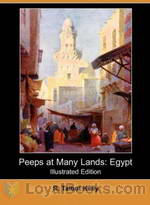 Peeps at Many Lands: Egypt
Peeps at Many Lands: Egypt
A short travelogue of Egypt, this book was written as part of an early 20th century series of travelogues on exotic destinations. | |
By: Rabindranath Tagore | |
|---|---|
 The Home and the World
The Home and the World
Rabindranath Tagore (1861–1941), also known by the sobriquet Gurudev, was a Bengali poet, Brahmo religionist, visual artist, playwright, novelist, and composer whose works reshaped Bengali literature and music in the late 19th and early 20th centuries. He became Asia’s first Nobel laureate when he won the 1913 Nobel Prize in Literature. The Home and the World is a 1916 novel, set in the estate of the rich Bengali noble Nikhil. He lives happily with his beautiful wife Bimala until the appearance of his friend and radical revolutionist, Sandip... | |
By: Rafael Sabatini (1875-1950) | |
|---|---|
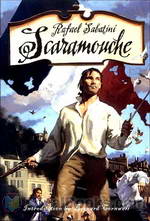 Scaramouche
Scaramouche
“He was born with a gift of laughter and a sense that the world was mad!” The wonderful opening lines of this 1921 novel set the tone for the rest of this delightful story of an adventurer and romantic who dons several roles in his colorful life. Scaramouche by Rafael Sabatini is an historical novel set in the turbulent times of the French Revolution. The plot describes Andre-Louis Moreau, a young lawyer adopted by his godfather who cannot reveal his parentage. Moreau inadvertently stumbles into political events and becomes a wanted man based on the evil machinations of a sinister Marquis... | |
 The Tavern Knight
The Tavern Knight
Follow the exploits of Sir Crispin Galliard, also known as The Tavern Knight, in his defence of the King of England against Cromwell and his Puritan Entourage. | |
By: Ralph Delahaye Paine (1871-1925) | |
|---|---|
 Book of Buried Treasure
Book of Buried Treasure
Described by the author as: BEING A TRUE HISTORY OF THE GOLD, JEWELS, AND PLATE OF PIRATES, GALLEONS, ETC., WHICH ARE SOUGHT FOR TO THIS DAY. Ralph Delahaye Paine was an American journalist and author popular in the early 20th century. Paine's book tells of pirates, heroes, scoundrels, and treasure seekers creating, stealing, seeking, and sometimes finding great wealth. It also tells of treasures yet undiscovered . It remains the stuff of dreams for countless kids growing up, and those of us who never grew up. - Summary by Tony Posante | |
By: Ralph Keeler (1840-1873) | |
|---|---|
 Vagabond Adventures
Vagabond Adventures
Ralph Keeler failed as a novelist, but this autobiography reflects a life well-lived with humor and adventure. Keeler was in the same literary circle as satirist Bret Harte, novelist Charles Warren Stoddard, editor Thomas Bailey Aldrich, and essayist William Dean Howells. He so impressed Mark Twain that Twain wrote an essay about him called "Ralph Keeler". In 1873, on his way to Cuba, he reportedly was thrown overboard by a Spanish loyalist who objected to his backing of the revolutionary, anti-Spanish movement. - Summary by John Greenman | |
By: Ralph Waldo Emerson (1803-1882) | |
|---|---|
 Conduct of Life
Conduct of Life
This is the best of Emerson's later works, qualifying his earlier popular essays, series one and two, with the heavier hand of experience. The Conduct of Life ostensibly is a set of essays about how to live life, but also is an amalgam of what life taught Emerson. | |
By: Ray Vaughn Pierce | |
|---|---|
 The People's Common Sense Medical Adviser
The People's Common Sense Medical Adviser
The People's Common Sense Medical Adviser In Plain English, Or, Medicine Simplified. By R.V. Pierce, M.D. INTRODUCTORY WORDS. Health and disease are physical conditions upon which pleasure and pain, success and failure, depend. Every individual gain increases public gain. Upon the health of its people is based the prosperity of a nation; by it every value is increased, every joy enhanced. Life is incomplete without the enjoyment of healthy organs and faculties, for these give rise to the delightful sensations of existence... | |
By: Reuben Gold Thwaites (1853-1913) | |
|---|---|
 Afloat on the Ohio
Afloat on the Ohio
Afloat on the Ohio, An Historical Pilgrimage, of a Thousand Miles in a Skiff, From Redstone to Cairo.There were four of us pilgrims—my Wife, our Boy of ten and a half years, the Doctor, and I. My object in going—the others went for the outing—was to gather "local color" for work in Western history. The Ohio River was an important factor in the development of the West. I wished to know the great waterway intimately in its various phases,—to see with my own eyes what the borderers saw; in imagination, to redress the pioneer stage, and repeople it. ( From the Preface ) | |
 Historic Waterways
Historic Waterways
Historic Waterways, Six Hundred Miles of Canoeing down the Rock, Fox and Wisconsin Rivers.This volume is the record of six hundred miles of canoeing experiences on historic waterways in Wisconsin and Illinois during the summer of 1887. There has been no attempt at exaggeration, to color its homely incidents, or to picture charms where none exist. It is intended to be a simple, truthful narrative of what was seen and done upon a series of novel outings through the heart of the Northwest. If it may induce others to undertake similar excursions, and thus increase the little navy of healthy and self-satisfied canoeists, the object of the publication will have been attained. | |